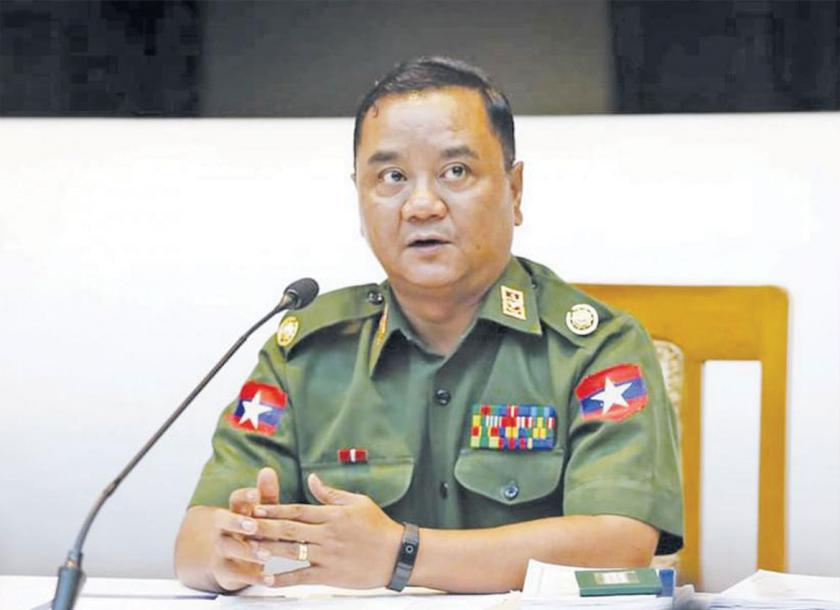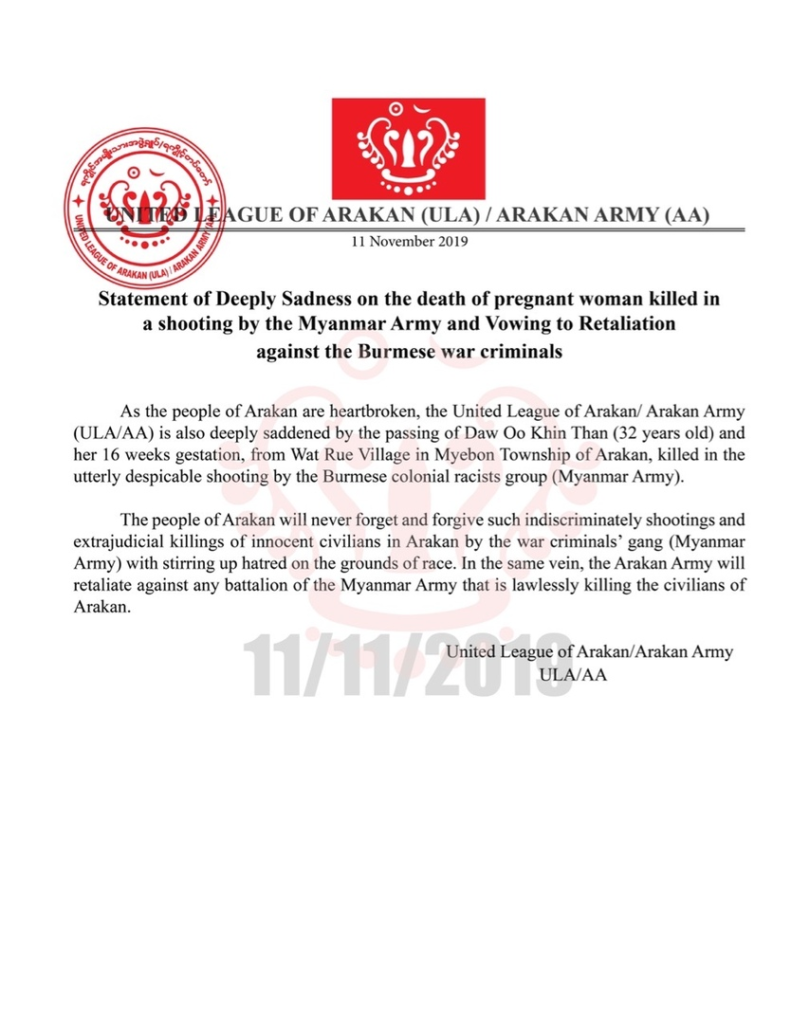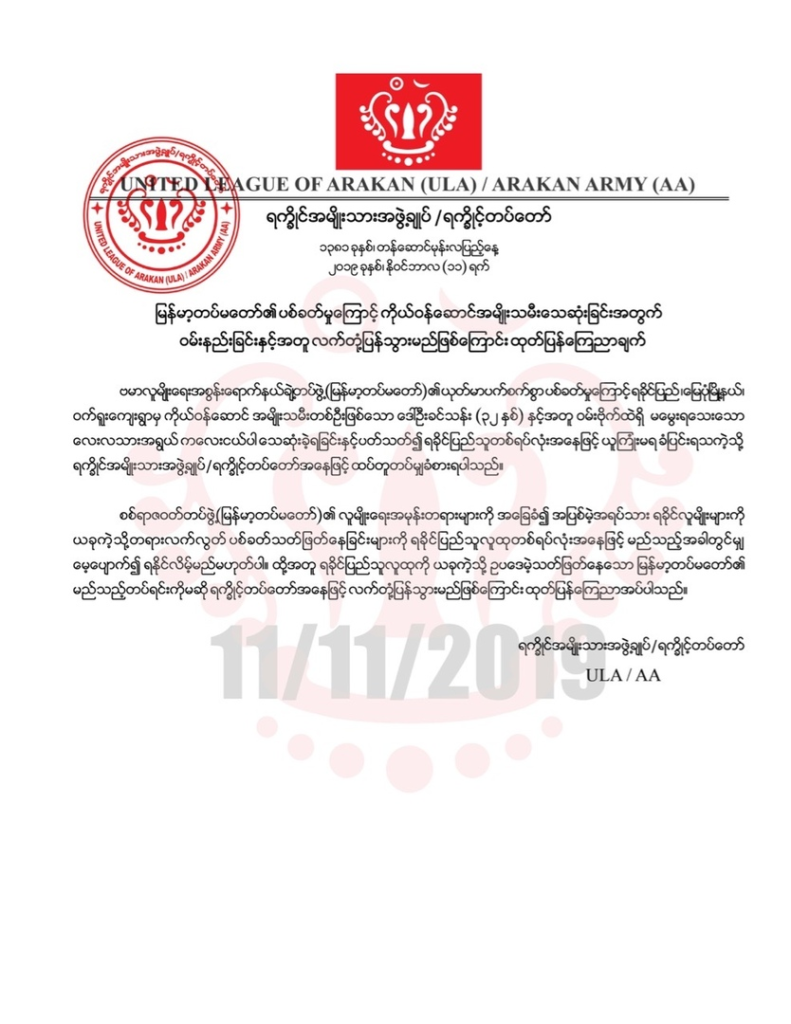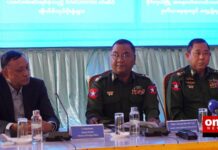With the rise of armed conflict violence, branching out into assassination, random shooting, abduction, extrajudicial punishment, the country seems to be “widening the space of armed confrontation or civil war and narrowing the peace negotiation process,” a phrase now popularly used by Burma or Myanmar political analysts, watchers and observers alike.
But let us first looks into some recent developments within the country’s political landscape and determine if this is really the case.
- On November 10, in Rakhine or Arakan State, Myaypone Township, Wetyu village a fisherman and his wife traveling back home on motor-propelled boat was shot at by the military or Tatmadaw killing the four-month pregnant wife instantly and slightly wounding the husband. A tragic trigger-happy Tatmadaw trooper’s had cost an innocent local’s life.
- In response to it on November 11, United League of Arakan/Arakan Army (ULA/AA) issued a statement condemning the act as a racial hatred move and vowed to revenge, while conveying its heartfelt condolences to the family of the deceased.
- After a relative calm for a period, from November 1 to 6 Ta’ang National Liberation Army (TNLA) and Tatmadaw clashed again five times in a row according to former’s spokesman Major Mai Aik Kyaw. He said these offensives by the Tatmadaw could derail the ongoing bilateral ceasefire talks between the National Alliance – Burma (NA-B), which his organization is a member together with the Arakan Army (AA), Kokang or Myanmar National Democratic Alliance Army (MNDAA) and Kachin Independence Army (KIA).
- Restoration Council of Shan State/Shan State Army (RCSS/SSA) soldiers fought with the Burma Army (aka Tatmadaw) multiple times this month with clashes breaking out in Mongkung Township, southern Shan State, including a military column of forty soldiers under Tatmadaw’s LIB-757 clashing with the RCSS/SSA in the jungle near Ho Hkai village-tract in the same township on the evening of November 9.
- RCSS said that its clashed 172 times with the Tatmadaw since it signed ceasefire with the central government in 2012; after signing the Nationwide Ceasefire Agreement (NCA) in 2015, it fought with Burma Army 51 times and 4 times after the Tatmadaw announced unilateral ceasefire at the end of last year, which ended in September this year.
- On November 10, Tatmadaw true news information team spokesman Brigadier General Zaw Min Tun told Myanmar Times that it would be difficult to deliver eternal peace to the people as promised in 2020.
In July 2018 during the third 21st Century Panglong Conference, Commander-in-Chief Senior General Min Aung Hlaing told the audience that in 2020 he would deliver eternal peace to the people.
However, the spokesman blamed the NCA-non-signatory Ethnic Armed Organizations (EAOs) for not joining the peace process by signing the NCA.

“We have aimed at 2020 until the NCA is signed. In between we see that there were no follow-up cooperation. With only two (more) signing (the NCA). In practice we don’t need to talk about the issue of signing now, for even (holding) meeting to negotiate is a very difficult task to handle. Although it is our goal, we cannot deny (that it is not achievable),” elaborated Zaw Min Tun.
To date there are nine EAOs that still have to sign the NCA.
On November 11, AA issued another a statement outlining its desire to exchange what it called prisoners of war (POWs) with the government, which the Tatmadaw rejected out of hand immediately.


In the statement, AA listed 17 POWs which included police and Tatmadaw troopers and proposed to be swapped with people who are in government custody for charges ranging from being members of AA or sympathizers helping the organization.
“No country’s army will negotiate with such terrorists,” Zaw Min Tun told the BBC recently and affirmed that operation to free the hostages will continue.
He said that there is a big difference of AA abduction and Tatmadaw’s arrest of the people.
“We arrest, detain and interrogate officially according to the law within the bounds of law,” he elaborated.
He further explained that the charged persons are sentenced or acquitted depending on how the judicial court decided.
Given such development on the ground, the culture of political dialogue to resolve differences which the former President Thein Sein fervently promoted might be seriously in jeopardy, if not going down the drain yet.
In the NCA that was signed by 8 EAOs on 15 October 2015 followed by another 2 in 2018, Chapter 1, Basic Principles in a paragraph wrote:
“Reach a negotiated settlement to end protracted armed conflict in the Republic of the Union of Myanmar, secure a nationwide ceasefire as a first step to end armed conflict and establish a new political culture of resolving political conflicts through political dialogue instead of force of arms.”
However for the time being, the armed ethnic conflict in general is escalating in northern Shan State and Arakan State; the bilateral ceasefire talks between the government-military and the NA-B is getting nowhere because of the heightened armed engagements with each other; AA hostage-taking and the increased Tatmadaw arrest of AA leadership relatives and suspected AA members and sympathizers counting nearly a hundred; all pointed out to more animosity, war and less political dialogue.
And if the culture of political dialogue is to be preserved, stakeholders need to loosen the screw than tightening it.
In a practical sense it would mean that all parties should come to the table, refrain from calling each other names (for example: AA terrorist organization and ultra Bamar nationalist and imperialist Tatmadaw), including AA releasing detained abductees and government-military freeing AA-related prisoners, will loosen the polarized political atmosphere.
There is no point to indulge in doublespeak such as calling AA a terrorist organization that has to be eradicated, while also negotiating with the outfit for bilateral ceasefire talks already for four times.
This kind of pro-active undertaking in turn might become conducive enough to foster bilateral ceasefire agreement, pave way for all-inclusiveness participation of all EAOs in peace process and eventually push for more political dialogue. There is hardly any other way left, if we don’t want to be involved in more wars and bogged down in ethnic conflict for decades to come.











Leave a Comments